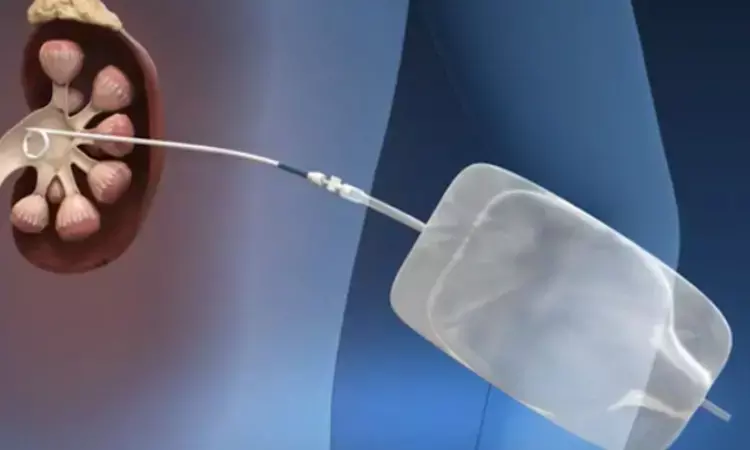- Home
- Medical news & Guidelines
- Anesthesiology
- Cardiology and CTVS
- Critical Care
- Dentistry
- Dermatology
- Diabetes and Endocrinology
- ENT
- Gastroenterology
- Medicine
- Nephrology
- Neurology
- Obstretics-Gynaecology
- Oncology
- Ophthalmology
- Orthopaedics
- Pediatrics-Neonatology
- Psychiatry
- Pulmonology
- Radiology
- Surgery
- Urology
- Laboratory Medicine
- Diet
- Nursing
- Paramedical
- Physiotherapy
- Health news
- Fact Check
- Bone Health Fact Check
- Brain Health Fact Check
- Cancer Related Fact Check
- Child Care Fact Check
- Dental and oral health fact check
- Diabetes and metabolic health fact check
- Diet and Nutrition Fact Check
- Eye and ENT Care Fact Check
- Fitness fact check
- Gut health fact check
- Heart health fact check
- Kidney health fact check
- Medical education fact check
- Men's health fact check
- Respiratory fact check
- Skin and hair care fact check
- Vaccine and Immunization fact check
- Women's health fact check
- AYUSH
- State News
- Andaman and Nicobar Islands
- Andhra Pradesh
- Arunachal Pradesh
- Assam
- Bihar
- Chandigarh
- Chattisgarh
- Dadra and Nagar Haveli
- Daman and Diu
- Delhi
- Goa
- Gujarat
- Haryana
- Himachal Pradesh
- Jammu & Kashmir
- Jharkhand
- Karnataka
- Kerala
- Ladakh
- Lakshadweep
- Madhya Pradesh
- Maharashtra
- Manipur
- Meghalaya
- Mizoram
- Nagaland
- Odisha
- Puducherry
- Punjab
- Rajasthan
- Sikkim
- Tamil Nadu
- Telangana
- Tripura
- Uttar Pradesh
- Uttrakhand
- West Bengal
- Medical Education
- Industry
New PCNL Technique with Pediatric Trocar Cystostomy Proves Safe and More Effective, suggests study

Recent research has shown that new percutaneous nephrolithotomy (PCNL) technique for pediatric trocar cystostomy and ultrasound guidance is a less harmful, less morbid way of removing stones from the kidney. This new approach decreased the bleeding risk, reduced recovery time, and is variably effective, even in low-resource hospitals. This case report was done by Lubis AS and colleagues, published in the International Journal of Surgery Case Reports.
Percutaneous nephrolithotomy (PCNL) is a standard procedure that removes kidney stones by creating a small incision in the back through which a nephroscope is inserted to suck out the stones. More recently, the advent of super-mini PCNL has utilized even smaller instruments in an almost minimally invasive access. However, traditional PCNL is often aided with tract dilation, which is frequently associated with complications, including bleeding, and may prolong recovery time.
The surgery was performed on a 55-year-old lady with bilateral kidney stones; the left one was larger than the right one. The procedure took 60 minutes, and there were no significant complications observed post surgery. The patient was a 55-year old lady weighing 217 pounds with a height of 5"3' and thus had a BMI of 36 kg/m2, with no history of any other significant medical condition. The patient was reported to be suffering from progressive bilateral flank pain, which was more on the left side as compared to the right side for the last five months. The renal function was within normal limits with a serum creatinine of 1.07 mg/dl, blood urea nitrogen of 33 mg/dl, and hemoglobin of 11.5 g/dl. CT scan showed numerous stones in both kidneys, the largest measuring 2.8 x 2 cm in size in the left kidney with moderate hydronephrosis.
Under general anesthesia, the patient was placed in a lateral decubitus with minimal forward tilting. A ureteral catheterization for the left ureter was inserted and ultrasound-guided induction of artificial hydronephrosis was done using normal saline. A small puncture in the left pelvicalyceal system was then performed, followed by progressive tract dilation from 6-French to 12-French dilators for the pediatric trocar cystostomy sheath. A 6-French ureteroscopy sheath was inserted to undertake the visualization and fragmentation of stone with a holmium laser. The fragmentation was carried out on 1.4 J, 15 Hz; further dusting was carried out on 0.4 J, 50 Hz. A 6-French double J-stent was placed to ensure adequate drainage and prevent postoperative complications.
The procedure was completed successfully in 60 minutes. There were no significant complications or adverse events noted in the postoperative monitoring. The hemoglobin levels were 10.6 g/dL post-surgery, and neither was there bleeding nor blood transfusion required. A KUB X-ray confirmed complete stone clearance. The patient was discharged in stable condition after three days of postoperative care.
This new PCNL technique offers several advantages such as it is minimally invasive, has less recuperation time, less risk of complications, and only minimal changes in hemoglobin levels in the postoperative period. It finds a place, especially in hospitals of developing countries where such expensive PCNL equipment may not be available. Success in applying pediatric trocar cystostomy and ultrasound guidance in this case proved the efficacy and safety of this technique.
Reference:
Dr Riya Dave has completed dentistry from Gujarat University in 2022. She is a dentist and accomplished medical and scientific writer known for her commitment to bridging the gap between clinical expertise and accessible healthcare information. She has been actively involved in writing blogs related to health and wellness.
Dr Kamal Kant Kohli-MBBS, DTCD- a chest specialist with more than 30 years of practice and a flair for writing clinical articles, Dr Kamal Kant Kohli joined Medical Dialogues as a Chief Editor of Medical News. Besides writing articles, as an editor, he proofreads and verifies all the medical content published on Medical Dialogues including those coming from journals, studies,medical conferences,guidelines etc. Email: drkohli@medicaldialogues.in. Contact no. 011-43720751


